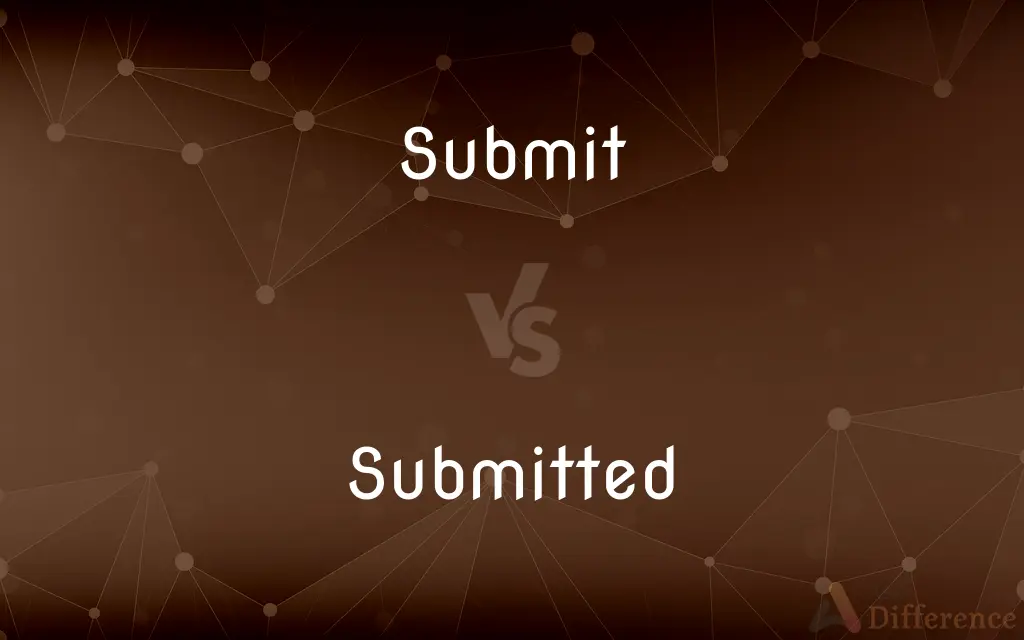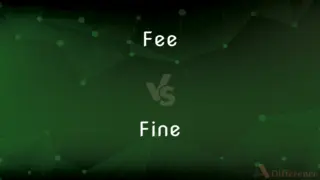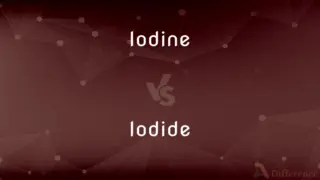Submit vs. Submitted — What's the Difference?
By Tayyaba Rehman & Maham Liaqat — Updated on March 5, 2024
"Submit" is the base form of a verb indicating the act of presenting or yielding, while "submitted" is its past tense, denoting the action has already occurred.

Difference Between Submit and Submitted
Table of Contents
ADVERTISEMENT
Key Differences
"Submit" refers to the action of presenting something for consideration, judgment, or use by another party. It implies the process is ongoing or about to occur. For example, when you say, "I will submit my application tomorrow," you are talking about a future action. On the other hand, "submitted" indicates that the action of presenting something has been completed. Using "submitted" in a sentence, such as "I submitted my application yesterday," indicates that the action is in the past.
To "submit" something can involve sending a document, proposal, or information to a specific entity or authority for review. Meanwhile, saying something has been "submitted" confirms that the process of sending or presenting has already been completed, and the item is now under consideration or awaiting response.
The usage of "submit" can also imply a form of compliance or surrender to authority, rules, or a higher power. Conversely, "submitted" in this context would mean that the act of compliance or surrender has already taken place. For instance, "He will submit to the court's decision" versus "He submitted to the court's decision."
"Submit" is commonly used to refer to the action of pressing a button or entering information into a form on a website. "Submitted" would then be used to confirm that the information has been successfully received or recorded by the system, as in "Your form has been submitted."
The distinction also affects the tone and tense of communication. "Submit" suggests an action that is planned or required, carrying a sense of immediacy or future orientation. "Submitted" provides a sense of completion, indicating that the required action has been taken and is now in the past.
ADVERTISEMENT
Comparison Chart
Tense
Base form (present, future)
Past tense
Implication
Action is to be done or is ongoing
Action has been completed
Context Usage
Presenting for consideration, compliance, entering information
Confirmation of submission, compliance achieved
Example Action
"I will submit the report by Monday."
"The report was submitted on Monday."
Compliance
Indicates intent to comply or surrender
Indicates compliance or surrender has occurred
Compare with Definitions
Submit
To enter information into a system.
Click here to submit your application.
Submitted
Agreement to follow rules or authority achieved.
He submitted to the terms after negotiations.
Submit
To yield or surrender to another's decision.
The competitor had to submit in the final round.
Submitted
Presented for consideration.
The essay was submitted before the deadline.
Submit
To present for consideration.
You need to submit your essay by Friday.
Submitted
Information entered into a system.
Her application was successfully submitted.
Submit
To agree to follow rules or authority.
He agreed to submit to the terms of the agreement.
Submitted
Yielded or surrendered to another's decision.
The competitor submitted in the final round, acknowledging defeat.
Submit
To propose or suggest.
The committee will submit a new plan for review.
Submitted
Proposal or suggestion made.
Their new plan was submitted for approval.
Submit
Submit is an EP by the British band Pitchshifter, released on 23 March 1992 by Earache on LP, MC and CD.French black metal band Blut aus Nord covered "Bastardiser" for their EP Debemur Morti.
Submitted
To yield or surrender (oneself) to the will or authority of another.
Submit
To yield or surrender (oneself) to the will or authority of another.
Submitted
To subject to a condition or process
Submit a tissue sample to testing.
Submit
To subject to a condition or process
Submit a tissue sample to testing.
Common Curiosities
Can both "submit" and "submitted" be used in formal contexts?
Yes, both forms are appropriate in formal contexts, with the choice depending on the tense and nuance required.
How do "submit" and "submitted" relate to online forms?
"Submit" is the action of pressing the button to send information, while "submitted" confirms the action has been completed.
Is "submitted" only used in past tense?
Primarily, yes, "submitted" is used to describe actions that have already occurred.
Do "submit" and "submitted" imply consent?
Yes, both can imply consent or agreement, especially in contexts of compliance or surrender, though "submitted" indicates that consent has already been given.
How do I know when to use "submit" or "submitted"?
Use "submit" when discussing future or ongoing actions and "submitted" for actions that have already taken place.
Can "submit" be used in future tense?
Yes, "submit" can be used to indicate future actions, e.g., "I will submit the form tomorrow."
Can "submit" be used in passive voice?
Yes, e.g., "The form must be submitted by Friday" is a passive construction.
Can "submitted" indicate completion without approval?
Yes, "submitted" indicates that a document or form has been sent or presented but does not necessarily imply it has been approved or accepted.
Is it correct to say "submit to authority"?
Yes, it's correct and implies agreeing to obey or follow the rules set by authority.
Does "submitted" always follow "has" or "have"?
Often, but not always. "Submitted" can stand alone in simple past tense or follow "has/have" in perfect tenses.
Share Your Discovery

Previous Comparison
Fee vs. Fine
Next Comparison
Iodine vs. IodideAuthor Spotlight
Written by
Tayyaba RehmanTayyaba Rehman is a distinguished writer, currently serving as a primary contributor to askdifference.com. As a researcher in semantics and etymology, Tayyaba's passion for the complexity of languages and their distinctions has found a perfect home on the platform. Tayyaba delves into the intricacies of language, distinguishing between commonly confused words and phrases, thereby providing clarity for readers worldwide.
Co-written by
Maham Liaqat













































